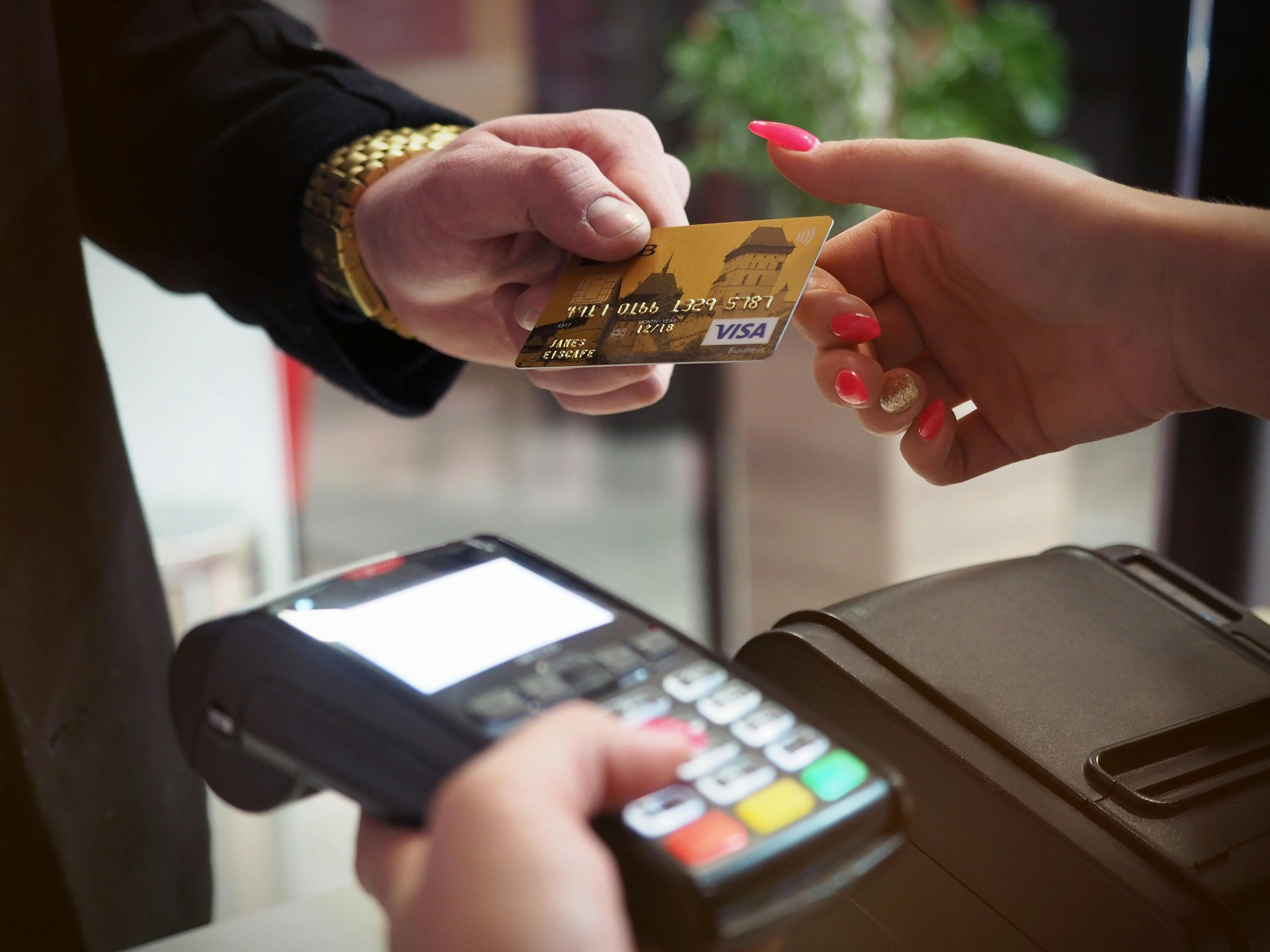Can You Buy a Car with a Credit Card? Expert Guide
Our guide explores the possibilities, risks, and rewards of buying a car with a credit card.
Published:
When you purchase through links on our site, we may earn an affiliate commission. Here's how it works.

Can you really buy a car with a credit card? It might sound unconventional, but it’s entirely possible. Depending on the type of credit card, it could even come with some appealing perks.
However, using plastic for a big purchase also carries risks you shouldn’t overlook.
In this expert guide, we explain everything you need to know about purchasing a car with a credit card in the UK—including the pros, cons, and factors to consider to make an informed decision.
What might stop you from buying a car with a credit card?
You can buy a car with a credit card, but two things could get in your way: the dealership and your credit card issuer.
The car dealership
Not all dealerships accept credit cards for car purchases. Even if they do, they might only let you use one for the down payment or cap how much you can charge.
This hesitation is primarily due to the processing fees of 1.5-3% on credit card payments, which dealers must cover. Some businesses consider this cost worthwhile for the convenience it offers customers, but car dealerships are a notable exception. For a £30,000 car, for example, a 3% fee is £900—money that cuts into the dealership’s profits.
Some dealerships might let you pay the full amount by credit card but could charge you more to cover the processing fee.
Always check the dealership’s credit card policy in advance to avoid surprises.
Your credit card issuer
Your card issuer might not allow you to pay for the car entirely with your credit card. Some credit card companies limit the maximum amount you can charge in a single transaction, such as £5,000.
Furthermore, depending on the price of the car, you’ll need a credit limit that’s high enough to cover the car’s cost.
Again, check your policy before making any decisions.
Pros of buying a car with a credit card
- Spread out the cost of a purchase: Using a credit card for car purchase lets you spread out the cost of the vehicle over time, rather than paying the full amount upfront. This can be especially helpful if you need to preserve cash flow for other expenses or investments.
- Convenience and flexibility: Paying for a car with a credit card can be easier and more convenient than traditional financing methods, as they don’t require extensive paperwork or lengthy approval processes. This can be helpful if you need a vehicle quickly
- Earn rewards and cashback: Some credit cards offer perks like cashback, points, or travel miles for every dollar spent. If you use a rewards credit card with a high earning rate, a vehicle purchase on the card could translate into significant rewards, potentially offsetting some of the cost.
- Potential for interest-free financing with 0% APR cards: If you have a 0% intro annual percentage rate (APR) credit card, you can finance your car without paying interest for a set period—sometimes up to 18 months.
- Greater consumer protection: Credit card purchases tend to have added consumer protections. For instance, in the UK, Section 75 of the Consumer Credit Act makes your credit card provider jointly responsible if something goes wrong with your purchase.
- Build or improve credit: Making a large purchase on your credit card and then making repayments consistently and on time can help build or improve your credit rating.
Cons and risks of purchasing a car with a credit card
- High APRs after the introductory period: If you’re using a 0% APR credit, interest rates can skyrocket to 20% or higher once the introductory period ends. If you haven’t cleared the balance by then, you could face substantial interest charges that significantly increase the car’s total cost.
- Impact on credit score: A large purchase will significantly increase your credit utilisation ratio (the amount of credit you’re using compared to your total available credit). This can lower your credit rating, though it should recover as you pay the balance.
- Dealer surcharges and transaction fees: As mentioned, some dealerships charge extra fees to cover the costs of processing credit card payments. These additional costs can significantly increase the car’s total price.
What to consider before using a car for credit card purchases
If you’re thinking of buying a car with your credit card, consider the following before taking the plunge:
- Promotional APRs and interest rates: Unless you have a 0% APR offer, carrying a balance after the purchase can result in steep interest charges. Calculate how much interest you might accrue if you can’t clear the balance in full.
- Credit limit and utilisation: Make sure your credit limit is high enough to cover the purchase, the down payment or the amount allowed by the dealership. Also, consider how the purchase will impact your credit utilisation ratio. Ideally, keep it below 30% to avoid negatively affecting your score.
- Alternative financing options: Compare credit card financing with other options, such as auto or personal loans, to determine the most cost-effective solution. Depending on your credit profile, traditional financing methods may offer lower interest rates and more favourable terms.
How paying for a car using a credit card works
If the dealership allows credit card payments for cars, the process is more or less similar to making any other large purchase.
You’ll provide your card details, and the dealership will process the transaction through its payment system. Some dealers may also accept payment through third-party processors like PayPal, which could involve additional fees.
Once the transaction is complete, your credit card issuer will add the purchase amount to your balance. In your next billing cycle, you’ll receive a statement detailing the purchase, your updated total balance, and the minimum payment due.
What protection do you get buying a car on a credit card?
Section 75 of the Consumer Credit Act protects you for credit purchases of £100- £30,000. This means that if you buy a car with your credit card and something goes wrong—like the dealership goes out of business or won’t fix a vehicle fault—your credit card company has to help you get a refund or compensation.
❗Section 75 protections might not apply if you use third-party payment processors like PayPal. Always pay the dealer directly with your credit card to qualify.
For transactions under £100 or over £30,000, the Chargeback scheme, which allows you to dispute and potentially reclaim funds for transactions gone wrong, may offer some recourse. Just keep in mind that, unlike Section 75, chargeback isn’t legally binding and depends on your card network’s policies (Visa, Mastercard, etc.). The process is less straightforward and doesn’t guarantee a resolution.
Buying a car with a 0% interest credit card
A 0% APR credit card allows you to make purchases without paying interest for a promotional period, ranging from 6-18 months or longer. If you clear the balance within this period, you can avoid interest entirely.
After the promotional period ends, the standard interest rate kicks in. These rates can range from 15%-30% or more, potentially leading to significant debt if unpaid. That’s why it’s essential to clear the entire balance before the end of the 0% APR period to avoid these high interest charges.
Here are some tips to stay on track:
- Make larger or additional payments: Whenever possible, pay more than the minimum to reduce the balance faster.
- Set up automatic payments: This ensures you never miss a payment. Missed payments can result in late fees or penalty APRs.
Can’t pay the entire balance during the promotional period? There’s another option: transferring the remaining balance to another credit card with a similar 0% APR offer and then cancelling your old credit card. This can buy you more time to pay the debt interest-free.
However, there might be some balance transfer fees. Also, cancelling and subsequently opening a new card with another issuer could temporarily lower your credit score due to a new credit inquiry.
Alternatives to using a credit card for car purchases
If buying a car with a credit card doesn’t seem like the best option, here are some alternatives to consider:
- Savings: If you have sufficient savings, paying for the car in cash is the most cost-effective option. It eliminates the need for borrowing and avoids interest charges.
- Auto loans: These are designed for car purchases. They typically offer lower interest rates than credit cards and longer repayment terms. You can obtain auto loans from banks, credit unions, or dealerships. The main drawback is that the loan is secured by the vehicle itself, which means the lender can repossess it if you fail to make payments.
- Personal loans: These are unsecured loans that can be used for various purposes, including car purchases. They often have lower interest rates than credit cards but higher rates than secured auto loans. Personal loans offer more flexibility in terms of repayment terms and loan amounts.
- Dealer financing: Many car dealerships offer financing options. However, dealer financing may have higher APRs and less favourable terms than loans from banks or credit unions. It's essential to compare dealer financing offers with other options to ensure you get the best deal.
- Leasing: Leasing allows you to use a car for a specific period, typically 2-3 years, in exchange for monthly payments. It’s a great option if you prefer driving a new car every few years and don't want the long-term commitment of ownership. However, unlike a purchase or financing agreement, leasing means you don’t own the car. You’ll have to return it at the end of the agreed period (though there may be an option to purchase it then). Leasing agreements often come with mileage limits and wear-and-tear restrictions, so consider your driving habits before choosing this option.
FAQs
Do car dealerships accept credit cards?
Some, but not all, car dealerships accept credit cards. Larger dealerships are more likely to accept them than smaller ones, primarily due to the high processing fees associated with credit card transactions. Always confirm the dealership’s credit card policy upfront to avoid surprises during purchase.
How much can you put on a credit card when buying a car?
It varies depending on the dealership’s policy and your credit card’s limit. Many dealerships allow only a portion—such as the down payment on a car—to be made via credit card. Always check with the dealership before attempting a large transaction.
Can I buy car insurance with a credit card?
Yes, most insurance companies allow you to purchase car insurance using a credit card. You can also use your credit card for other car-related expenses, such as breakdown cover for when your car breaks down, maintenance, repairs, and fuel. Using a credit card for these payments can be convenient and may help you earn rewards.
